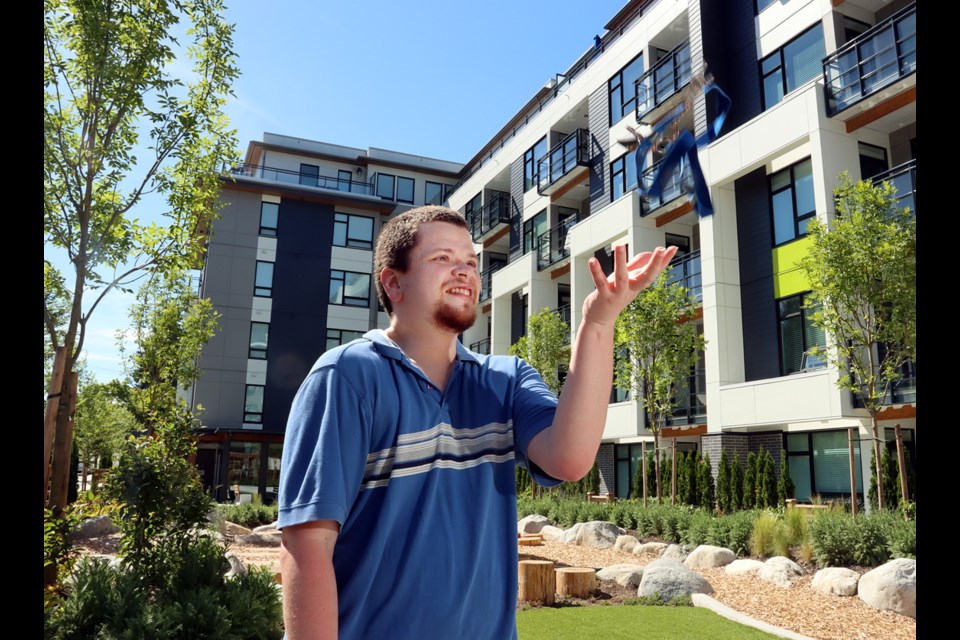For Andrew Wiseman, affordable inclusive housing is more than buzzwords for cities trying to achieve more diversity.
It’s more than an amenity developers try to leverage for more density.
It’s his life.
In January, Wiseman, 37, received the keys and electronic entry fob to a gleaming new one-bedroom condo in George, a 179-unit development on St. George Street in Port Moody.
He carries them proudly wherever he goes, hanging from the end of a lanyard around his neck — visiting his parents in Coquitlam, to his job at a McDonald’s restaurant in Burquitlam, to the electronics store to check out the latest games for his video game system.
The condo Wiseman calls home is one of six such units in George that was achieved through a partnership between Kinsight — a social services agency that works with families of children, youth and adults with developmental delays — and the Langley-based developer Marcon, along with support from the city of Port Moody and BC Housing.
The units provide independent living for up to nine residents, with flexible spaces to accommodate their support needs, and even some furnishings provided by IKEA Coquitlam, La-Z-Boy and the Port Moody Foundation.
Kinsight’s CEO Christine Scott said the intention of such partnerships “is to create an environment where people have meaningful opportunities for social inclusion and a real sense of belonging.”
For Wiseman, moving into his own apartment at George is a big step in his journey to independence.
After spending the first 30 years of his life in the protective embrace of his family’s home, he moved into a shared apartment at Kinsight’s former fourplex just down the street.
But in 2017, Marcon approached Kinsight with an opportunity to provide new homes for residents of the aging structure that was in serious need of repairs and no longer met the standards to house residents who required supports.
The company’s amenity package it offered to the city in return for increased density also included daylighting a stretch of Dallas Creek and a 3,360 sq. m. public park that includes a greenway trail and open play area.
“Our motto, ‘Building for Life,’ means building for all,” said Marcon’s vice president of development, Nic Paolella, in a press release.
Scott said her organization receives many overtures from developers, but turning them into reality requires a shared vision.
“We have to make sure there’s truly opportunities for all,” she said, adding Kinsight is also working with Marcon on another six units in a new tower the company is building in Coquitlam, as well as two additional projects in Port Moody with other developers.
Scott said not only are the partnerships providing new homes for Kinsight’s clients, they’re changing the conversation around affordability in the hyper-expensive housing market around Metro Vancouver.
“When I hear councillors use the language of inclusive housing, I know we’re well underway,” she said, adding the rent that residents pay to live in the units is low enough that they’re able to put income they earn toward their quality of life.
Since moving into his new home, Wiseman said he’s been able to meet some of his neighbours. He’s also improved many of his life skills, like managing his finances and broadening his cooking repertoire beyond Kraft Dinner to making lasagna, chilli and stir fry.
Wiseman said he enjoys having his own space. His younger brother comes over to hang out. His relationship with his former roommate has blossomed into a friendship. In fact, he’s feeling so good about things, he’s thinking of going back to school for cashier’s training.
“My mom didn’t think I could live on my own,” he said. “Now, I have the respect of my parents. I choose my path.”
That’s music to the ears of Tina Matysiak, Wiseman’s support worker.
“He’s just grown as a human being.”
Scott said while KInsight’s growing number of partnerships with developers are a success story, they’re but a dent in the demand for affordable, inclusive housing.
According to a 2020 report by Community Living BC and the Inclusion BC inclusive housing task force, there’s a need for about 5,000 such units across the province to accommodate individuals with developmental disabilities who are ready and able to live on their own, with supports at hand, in the next five years.
“We’ve made great strides,” Scott said. “But there’s an enormous amount of work to do yet.”



